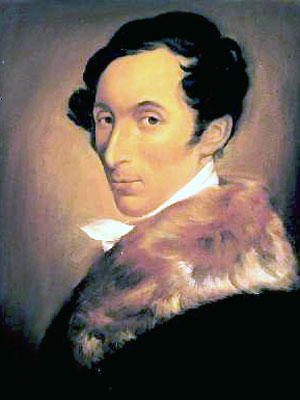| Edit | Map | Home | New Post | New Gallery |
Support
|
 | |
Carl Maria von Weber (German: Carl Maria von Weber; November 18 or 19, 1786, Oityn - June 5, 1826, London) was a German composer, conductor and pianist. The founder of German romantic opera. From childhood, Weber grew up in the atmosphere of the theater, because his father was an entrepreneur in the troupe. Due to frequent moves, he did not have a permanent education, but at the end of the 1790s he began to study under the guidance of Michael Haydn (Joseph Haydn's younger brother) and wrote his first works, including the opera "The Forest Girl" and the singing play "Peter Schmoll and his Neighbors".
From the age of 14, he performed as a pianist, and at the age of 17 - as a conductor. In 1803, he studied with Abbot Vogler, who instilled in Weber an interest in folk music.
The years 1804–1817 saw the formation of the composer's opera work. Weber worked at various courts and theaters (kapellmeister at the Breslau opera house, served for several years as the personal secretary of the Duke of Württemberg in Stuttgart, directed the opera house in Prague (1813–1816). In Darmstadt, he met with other composers, the "Harmony Society" was founded ", whose composers included Meyerbeer. Weber was interested in German literature and German music (song). He began to write critical articles. The operas "Rübetzal", "Silvana", "Abu Hassan" were created.
The years 1817–1826 are a mature, "Dresden" period. At that time, Weber worked as a conductor and head of the opera house, headed the Chapel of the Electors of Saxony. There was a struggle for the national German opera, against the dominant position of the Italian one. During this period, Weber created his best works: sonatas, "Invitation to the Dance", raised the everyday genre to an artistic height, "Concertpiece" for piano and orchestra - program music, a virtuoso concert piece. A significant place in Weber's work was occupied by waltzes, which can be considered an advance of Chopin's works in this genre.
In 1821, K. M. Weber wrote his most famous opera "The Free Rifleman". It was staged in Berlin with great success. "The Magic Rifleman" is considered the first national romantic German opera. The genre of the opera is a romantic singing game.
1823 - the opera "Evrianta". Written for the Vienna Opera. A new type of opera is a grand romantic chivalric opera without spoken dialogue. The plot is based on a medieval legend (XIII century). This opera did not receive much recognition. It preceded Wagner's opera (Lohengrin).
1826 - the opera "Oberon", staged in London. This is a fairy-tale opera, the genre is a singing game. Here fantasy meets reality.
Shortly after the premiere of the opera "Oberon" in London, Weber died in the house of the conductor George Smart (June 5, 1826).
Weber is considered the first German composer who deeply understood the composition of national music and raised national German folklore to high artistic perfection. Throughout his career, he remained faithful to the national direction, and his operas lay the foundation on which Wagner built Tannhäuser and Lohengrin.
The Variations on the song "Beautiful Minka" (German: Schöne Minka) (Air Russe varié pour le Pianoforte, op. 40, 1815) are related to the Ukrainian theme, written by Weber for Grand Duchess Maria Pavlovna, Duchess of Saxe-Weimar-Eisenach. In fact, "Harna Minka" is a German rendition of the well-known folk song "The Cossack Went to the Danube".
Taras Shevchenko was familiar with Weber's work, in particular with the opera "The Free Rifleman" (German: Der Freischütz) and the music for the drama P.-O. Wolf "Preciosa". He mentioned these works in the novels "Musician" and "Unfortunate" and in "Schodennik" (February 5, 1858). |
Author: Sonya Version: 1 Language: English Views: 0
|
Short link: https://www.sponsorschoose.org/a168
Short link to this version: https://www.sponsorschoose.org/n194
Created by Sonya at 2023-05-30 08:23:12
Last modified by Sonya at 2023-05-30 22:01:09
|